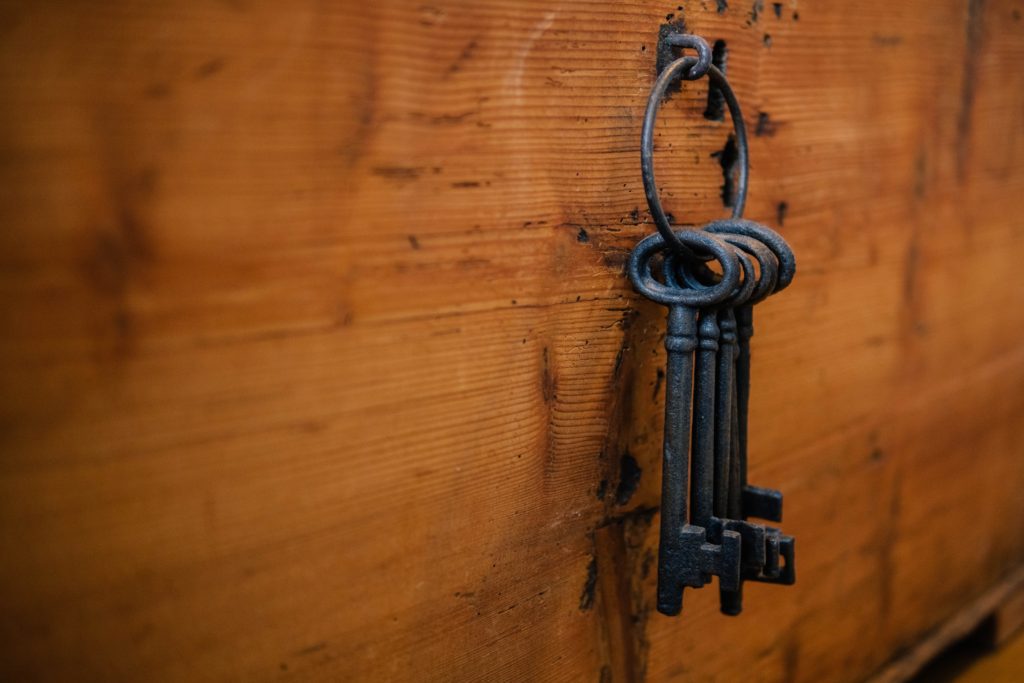In the last post, I wrote about some of the keys for me to live well with Parkinson’s: acceptance, a positive outlook, gratitude, community, and education. Here, I want to share a few more keys that give me access to spaces I want to inhabit in a life with Parkinson’s and keep out what threatens me in those spaces.
More Keys
When I consider the keys to living with Parkinson’s, several come to mind.
- Discipline. I find that being disciplined in a life with Parkinson’s is a key to managing it. I’m talking about discipline concerning things like exercise, medication protocols, seeing doctors and other care team members (physical therapists, speech therapists, and counselors), spending time with running partners, writing partners, our sisters and brothers in the Parkinson’s community, and others who enrich our lives. For me, attention to these matters makes a big difference in how I feel, physically, emotionally, and spiritually. But the key is that I have to be disciplined in my efforts. I have to commit to these practices and stay with them. Otherwise, I lose the benefits they offer.
- Goals. Parkinson’s is the great thief. It steals many things from us that we want and need for a good life. Among the most valuable things it can steal from us, but which we can also protect from its grasp, are our goals for the future. I find that many people who live with Parkinson’s assume their previous goals (and the dreams linked to them) are unreachable and that formulating and pursuing new goals is a waste of time. Nothing could be farther from the truth. We can still pursue our goals and plan to work toward new ones. So get going on that if you’re not already working on it. Keep aiming for what brings you joy, meaning, purpose, and a sense of accomplishment. Adjusting goals is fine, we all have to do this sometimes, whether we have Parkinson’s or not. The point is that having goals is part and parcel of being human, so don’t give up on pursuing your goals.
- Purpose. Another key I will mention is that all of us need purpose in life—all of us. And while it’s true that life becomes more challenging with Parkinson’s, there are still many things that we can do that give us a sense of purpose and, as important, that may contribute to others’ wellbeing and positive outlook along with ours. I’m thinking of things like reaching out to others in the Parkinson’s community and offering to help them with what they may need: a ride to an exercise class or support group, or a doctor’s visit. A phone call to someone who is struggling with anxiety or depression. Allowing a care partner for a person with Parkinson’s (PwP) to have a couple of hours of respite. We can also send emails, texts, or cards to those who might benefit from knowing they are thought of and that we are sending well wishes (and who doesn’t benefit from receiving these kind gestures?). We can raise money for Parkinson’s support services or research. We can also help educate others and raise awareness of Parkinson’s and needed resources for support. If we have a purpose we are happier, more settled, and more satisfied with our lives.
- Humor. The comedian Steve Martin once noted that “A day without sunshine is like, you know, night.” This brings me to humor. For me, a key to managing Parkinson’s is finding ways to laugh every day, including, at times, laughing at or with Parkinson’s. Having Parkinson’s is not funny per se (no one wants to have it) but it does come with moments of humor. For example, when my daughters were young, I was grumpy with one of our dogs because he was barking out the window at another dog, and one of my girls looked at me and said, “Daddy, be nice to him; he has Barkinson’s disease.” This moment and countless others like it have been a balm for me, and for my family, that provides relief from the pain that adjoins a life with Parkinson’s. Also, while I am not all that funny, my wife and children are extremely funny! So my advice is to find the funny people in your life and spend as much time with them as you can. And remember Steve Martin’s wisdom.
Of course, other keys offer access to a better life with Parkinson’s and help keep the spaces we want to inhabit accessible and secure. I have shared some of the keys that I rely on. What are your keys? Tweet me what is essential to your life with PD at @PDWise, or send me an email at allan(at)pdwise.com. I’d love to hear from you.
__________
Allan Cole is Deputy to the President for Societal Challenges and Opportunities at The University of Texas at Austin, where he also serves as a professor in The Steve Hicks School of Social Work, and, by courtesy, as a professor of psychiatry and behavioral sciences at the Dell Medical School. Diagnosed with Parkinson’s in 2016, at the age of 48, he is the author or editor of many books on a range of topics related to bereavement, anxiety, and spirituality. His latest book is Counseling Persons with Parkinson’s Disease (Oxford University Press) and his next book, Discerning the Way: Lessons from Parkinson’s Disease (Cascade), will be published in 2021. He is also working on a book of poetry titled In the Care of Plenty: Poems (Resource Publications), which will be published in 2022. Follow him on Twitter @PDWise.

